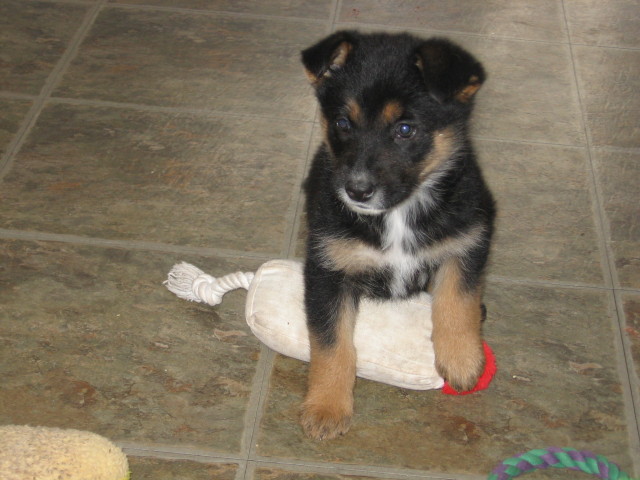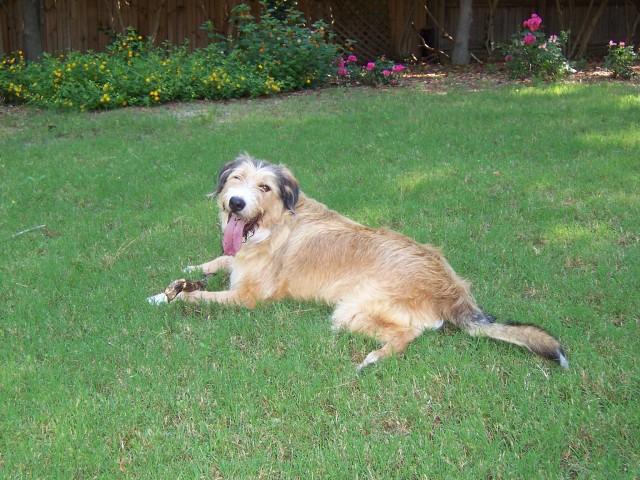QuestionHave you hear of Cesar Millan and if so what do you think of his techniques?
http://www.cesarmillaninc.com/index.php
AnswerHi, Madlyn.
Here's a review I wrote on Amazon for Millan's first book:
"Why Cesar's Way Isn't Really the Dog's Natural Way, May 11, 2006
"I find Cesar Millan to be a telegenic and interesting TV personality. I've only seen his show on NGC a few times, and I saw the Oprah episode. But the few times I have seen him he's always seemed magnetic, charming, and soft-spoken, and comes across as very knowledgeable, which is the problem with this book.
"I should go back and mention the first time I became aware of Millan, before all the media hype, was about seven years ago, I think. I'd been a dog trainer in New York City for about eight years at the time (it's been fifteen now), and Cesar was featured on a "human interest" news byte on the local ABC affiliate. He was walking a dozen or so dogs and every time one of them tried to get ahead of him, he would give a snap on the choke chain, and give a guttaral, "No!"
"As a dog trainer I have to say this seemed a bit demented to me. He was very determined not to let any of those damn dogs walk ahead of him, as though driven by some deep-rooted personal issues, not by an intelligent and rational training protocol.
"He explained to the camera, as he does now in this book, that when a dog walks ahead of you he thinks that *he's* the pack leader. This is a very old-fashioned idea that is completely false. It's a puzzle to me why it's still so popular, and why the people at National Geographic wouldn't take him aside and say, "That's not really true..."
"David Mech, who's one of the world's leading experts on the pack behavior of wild wolves -- which is where the dog's pack instinct originated, in the DNA of the wolf -- did a study to see which member of a real, wild wolf pack takes the lead while the pack travels together. This is what he found:
"Although dominant breeding wolves provided most leadership, we found that subordinate wolves, both breeders and nonbreeders, also provided leadership during travel." And Mech found *no* evidence that when these "*non*-dominant" wolves took the lead they had delusions that they were suddenly in charge. Nor did the "dominant" wolves correct them for moving ahead of the rest of the pack from time to time. And what about police dogs, drug and bomb detection dogs, search-and-rescue dogs? If they didn't walk ahead of the handler from time-to-time (in some cases, ALL the time), they couldn't do their jobs properly. And these are the best-trained and most obedient dogs on the planet!
"Mech has also stated that a real pack has no leader per se, just parents, who carefully nurture and guide their offspring: "The significance of dominance relationships within pack society has been overrated ... wolf packs are best understood as family groups ... Breeding wolves [only] provide leadership because offspring tend to follow their parents' initiative."
"That sensibility -- of providing parental leadership, not by overt actions, such as preventing a dog from walking in front of you, or not letting the dog urinate during the bulk of his walk, or any of the other things that real pack leaders (or mama and papa wolves) never do -- is sadly missing from CESAR'S WAY. In fact many if not most of the things Cesar asserts are "natural" ways of showing leadership don't actually exist in nature!
"There has been a great hue and cry over Millan's success. Dr. Nicholas Dodman has been quoted as saying that Cesar has sent dog training back to the dark ages or some such nonsense. The truth is Dodman and those who call themselves "positive" trainers actually know less about dogs than Millan does. For one thing, since positive methods rarely work to cure behavioral problems, Dodman has led us into the brave new world of solving most if not all behavioral problems with drugs. If Dodman knew the first thing about dogs he wouldn't need to use drugs at all.
"Cesar talks a lot about "balance" in this book. And for dog owners who've already found out for themselves how invalid and ineffective learning theory and treat-based training is, that word balance strikes a major chord. The thing is, though, the pack isn't really about being in balance, which is merely the equal oppostion of forces (such as dominance and submission). Being in balance means there's a constant tension between those forces, and the pack is more about being in harmony than being in balance. The difference between the two is that harmony rightly suggests that pack members want to cooperate, work together -- as wolves do while hunting -- rather than take sides in opposition to one another, which is extemely rare in real wolf packs. Besides, which kind of relationship would you rather have with your dog, one that's balanced but constantly full of tension, or one that's harmonious and tension free?
"That said, there is a great deal of truth to some of Cesar's other positions, like that dogs need a job, that exercise is crucial (though it should be vigorous, playful exercise, not long walks or long runs, which seem to be his preference). I also agree that food isn't the best training tool (though at times it can be useful), that staying calm and in control of your own emotions is key when working with dogs, and that our four-legged friends need less affection than most dog owners tend to give.
"But in reality, after their food and shelter needs are taken care of, dogs basically need three things:
"1) Play
"2) Structured Play (with a little training mixed in), and
"3) More Play
"I think most people who read this book (and I'm certainly not trying to dissuade anyone from doing so, not that I could if I wanted to) will find that Cesar's philosophy and techniques DON'T WORK in the real world as well as they do on TV (though they work far better than politically correct, "positive" methods do). But playing with your dog, getting down on his or her level, making learning fun and exciting to the dog's *real* instincts (for which play holds the key), and being a loving and nurturing pack "parent" who sets necessary boundaries without doing it by attempting to mimic a "pack mentality" that doesn't exist in nature, WILL."
That was a while ago. I have seen him do some sensible things since then, having to do with a dog's prey drive (which Millan didn't know how to solve, so he brought the dog to an "expert" on prey drive). So in that respect, he's still miles ahead of Nicholas Dodman et al, but his belief that when he's acting "calm assertive" dogs see him as "the pack leader" can't possibly true. There is no pack leader in wild wolf packs. If you slo-mo his "calm assertive" thing, you'll see he's really acting like a predator (i.e., a prey animal that's stopped running, has turned on the pack, and is staring them down with his eyes high above theirs).
Here's a link that might help explain where "dominance" really comes from, and how this myth got started: http://tinyurl.com/2q2esp
Remember, George Washington NEVER wore wooden teeth. That's another myth. But even though it's been corrected thousands of times, people still believe it's true. Same thing with the myth of the pack leader. (By the way, Washington's dentures were made of ivory, which to an inexperienced eye might look like wood; though wooden dentures would be very quickly dissolved by the enzymes contained in saliva, so would make a terrible material for false teeth.)
I hope this helps,
LCK

 puppy problems
QuestionQUESTION: I am the proud owner of 2 german shep
puppy problems
QuestionQUESTION: I am the proud owner of 2 german shep
 uncontrollable beagle
Question
max
My beagle is a year and a half. Ive had hi
uncontrollable beagle
Question
max
My beagle is a year and a half. Ive had hi
 Mini Daschund with anxiety issues
QuestionAbigayle
QUESTION: I have a 3 1/2 yr old
Mini Daschund with anxiety issues
QuestionAbigayle
QUESTION: I have a 3 1/2 yr old
 agressive silky terrier
Question
Lucas 1 year old
Hi Jennifer:
I have a
agressive silky terrier
Question
Lucas 1 year old
Hi Jennifer:
I have a
 anxious dog
Question
Louie
Hi, We adopted a 2 year old male A
anxious dog
Question
Louie
Hi, We adopted a 2 year old male A